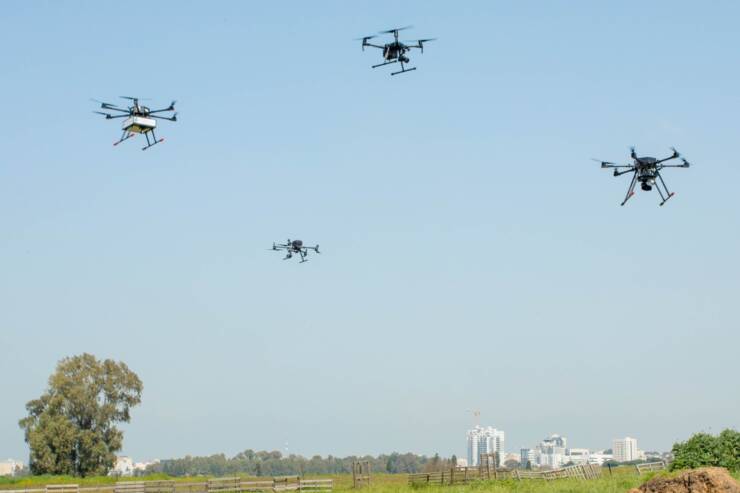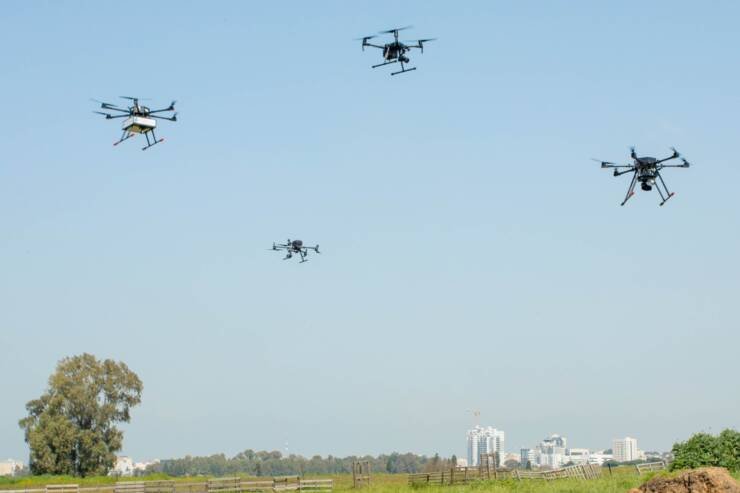
Tel Aviv. The State of Israel has achieved significant progress over the last year in shaping the future of mobility, introducing a national drone network that will primarily enable cargo transportation in urban areas through smart and innovative airspace management. During this first-of-its-kind pilot, a large number of drones operated by several companies are now flying over the city of Hadera.
Those sorties are managed by one centralized, autonomous Unmanned Aircraft System Traffic Management (UTM) located in the traffic and air traffic control centers of the Ayalon Highway Company in the central Haifa Bay.
The drones flying in the demonstration perform about 300 sorties a day. Each drone is simulating the execution of various types of tasks and operations: food delivery, transporting medicine and medical equipment, agricultural services and many others.
The flights are being carried out by five different companies (listed below). About 20 drones are flying simultaneously, and hundreds of others are scheduled to fly in the coming days.
This is the first such demonstration in Israel out of a series of eight planned to take place over the next two years. This is a significant global breakthrough in the ability to manage drone operations at scale, which will lay the foundation for future national drone operations in many areas. To support the current phase of the pilot, the participating companies have been granted funds by the Israel Innovation Authority, as part of the Innovation Authority Piloting Fund Program.
Since March 2020, the Israel C4IR Center at the Israel Innovation Authority, in cooperation with the Israel Ministry of Transport (through the Ayalon Highways Company) and the Civil Aviation Authority of Israel, and a number of other entities, have been working to promote the use of drone delivery as a service, as part of the NAAMA Initiative (a Hebrew acronym for Urban Aerial Transport).
The project was established to enable drones to be deployed for the public good, ultimately reducing congestion on public roads, transporting medicine and medical equipment and performing medical tasks, delivering various commercial goods more quickly, and enabling Urban Air Mobility (UAM) to function at scale in the future. During this time, the NAAMA Initiative involved many local, international, public, and private stakeholders to enable technological breakthroughs while removing regulatory barriers and enabling Israel to become a “beta-site” for drone piloting and operations.
The goal is to certify regulations that will enable the operation of a safe delivery routine using drones.
When the experiment progresses the UTM center will have to coordinate 300 drone flights per day, using an autonomous airspace control system.

Program partners are: High-Lander Aviation Ltd, Kando, Airwayz Drones Ltd; HarTek Technologies Ltd; F. T. Aerial Solutions Ltd; and Simplex Interactive Ltd.
The flights in the first phase are performed over an open area and will continue at a later phase with flights over the city.
The significant difference in this experiment from similar projects conducted so far in the world is the combination of several aircraft from several companies all controlled from a remote control center and the fact that the flight complex is not limited to “corridor.”
In addition to flying their drones, each of the five companies will operate the UTM center in Haifa. Each for a period of two weeks.
The companies will offer their know how and technologies that are related to a UTM and when the full experiment is complete, two years from now, will compete in a tender to operate the UTM center commercially.
Simplex is operating the UTM in the first two weeks of the experiment.
Ofer Haruvi, chairman of Simplex told Raksha Anirveda that his company and the others each operated 28 flights on the first day. The number will go up to 60 on March 15.
Haruvi added that the flight on the first day were fully coordinated and and added that he is confident that the full experiment will result in a reliable systems that will allow drones to perform delivery missions over Israeli cities.
-The writer is an International Roving Correspondent of the publication








